Jopie Koopman (1910-1979) was one of the stars of the Dutch cinema of the 1930s. The pretty cabaret artist sang and played in several revues and early sound films.
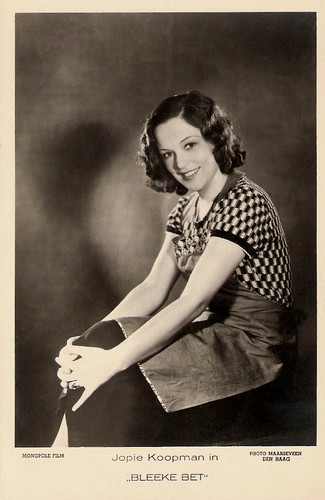
Dutch postcard by Monopole Film, Rotterdam. Photo: Dick van Maarseveen. Jopie Koopman in Bleeke Bet/Bleak Beth (Alex Benno, Richard Oswald, 1934). Collection: Geoffrey Donaldson Institute.
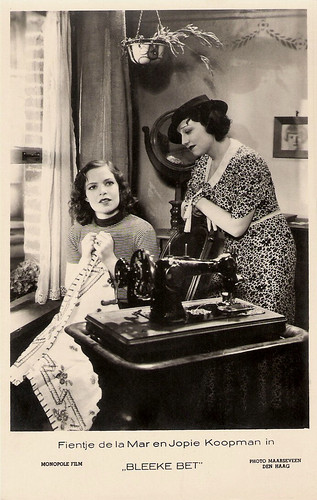
Dutch postcard by Monopole Film, Rotterdam. Photo: Dick van Maarseveen. Fien de la Mar and Jopie Koopman in Bleeke Bet/Bleak Beth (Alex Benno, Richard Oswald, 1934).

Dutch postcard by M. B.& Z. (M. Bonnist & Zonen, Amsterdam), no. 8. Photo: Loet C. Barnstijn Film. Roland Varno, Jopie Koopman and Annie van Duyn in the romantic comedy Malle gevallen/Silly Situations (Jaap Speyer, 1934).

Dutch postcard by M.B. & Z. (M. Bonnist & Zonen, Amsterdam). Photo: Dick van Maarseveen, Den Haag / Nationaal Film. Henriëtte Davids and Jopie Koopman in Op stap/On the Move (Ernst Winar, 1935).
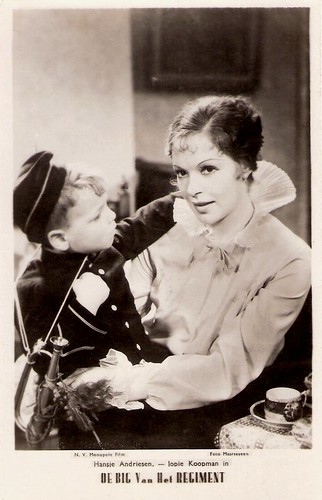
Dutch postcard by Monopole Film, Rotterdam. Photo: Dick van Maarseveen. Hansje Andriesen and Jopie Koopman in De Big van het regiment/The Darling of the Regiment (Max Nosseck, 1935).
Johanna Bernardina (Jopie) Koopman was born in Amsterdam, The Netherlands in 1910, as the daughter of Johan Koopman en Anna Maria Petronella Eengelberd. Jopie Koopman is regularly confused with her niece of the same name Johanna Bernardina Jeanne (Jopie) Koopman (1908-1981), the first Miss Holland in 1929.
At the end of the 1920s Jopie and her younger sister Jeanne tried to enter the amusement business as chorus girls. Jopie made her stage debut in 1927 with the Stappers Revue, followed by other revues including one with legendary Dutch cabaret star Louis Davids. From 1930 to 1933 she performed in Paris, London and Berlin with the Berlin artists Eric and Peppy Hollander. In their act, she sang and played the violin.
With her good looks and singing talent, she was ideal for the new Dutch sound cinema. In 1934 she made her first film appearance in Bleeke Bet/Bleak Beth (Alex Benno, Richard Oswald, 1934) as a young girl from the Jordaan, the old heart of Amsterdam.
Her co-star and love interest in the film was Johan Heesters, who later would become a huge star in Germany as Johannes Heesters. The film was a success, and it meant a breakthrough for Jopie.
That same year she also appeared in the comedy Malle gevallen/Silly Situations (Jaap Speyer, 1934) based on a novel by Hans Martin. Jopie had a nice part with a lot of songs and she had well-known co-stars like Johan Kaart, Roland Varno and Louis Borel. Jopie Koopman also made some successful records with the popular singer Willy Derby, including two duets from the Dutch musical De Jantjes/The Tars. She also often appeared on Dutch radio in popular shows.

Dutch postcard by Monopole Film, Amsterdam. Photo: Maarseveen, Den Haag. Clara Vischer-Blaaser, Aaf Bouber, Sylvain Poons, Corry Vonk, Fien de la Mar and Jopie Koopman in Bleeke Bet/Bleak Beth (Richard Oswald, Alex Benno, 1934).

Dutch postcard by Monopole Film. Photo: Maarseveen, Den Haag. Fien de la Mar and Jopie Koopman in Bleeke Bet/Bleak Beth (Richard Oswald, Alex Benno, 1934).
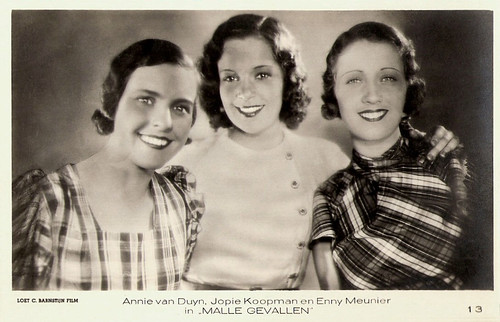
Dutch postcard by M. B.& Z. (M. Bonnist & Zonen, Amsterdam), no. 13. Photo: Loet C. Barnstijn Film. Still for Malle gevallen/Silly Situations (1934) with Annie van Duyn en Enny Meunier.
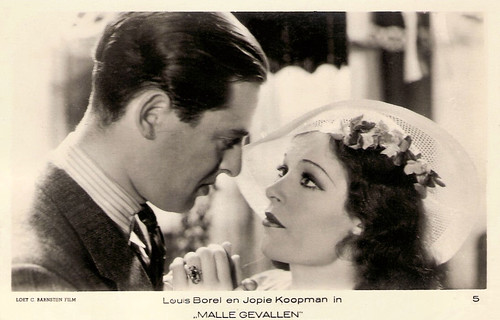
Dutch postcard by M. B.& Z. (M. Bonnist & Zonen, Amsterdam), no. 5. Photo: Loet C. Barnstijn Film. Still for Malle gevallen/Silly Situations (1934) with Louis Borel.
In 1935 Jopie Koopman appeared in the musical Op Stap/On the Road (Ernst Winar, 1935). The film was written by Jacques van Tol, a well-known songwriter at the time, who was married to Jopie’s sister, Jeanne Koopman. The other stars of this film were Louis Davids and his sister Henriëtte 'Heintje' Davids, and Dutch diva Fien de la Mar as the glamorous film star Bella Ramona. Again Jopie sang some songs in the film, including a duet with her fiance in the film, played by Frits van Dongen - the later Hollywood star Philip Dorn.
She also appeared as the piano teacher Nora in the war comedy De Big van het Regiment/The Mascot of the Regiment (Max Nosseck, 1935) and in 't Was een april/It was 1 April (Detlev Sierk aka Douglas Sirk, 1936). This comedy, which is considered lost, was an alternate language version of Sirk’s directorial debut, the German comedy April, April! (1935) with Lina Carstens.
In 1936, Jopie Koopman's film career came to an abrupt end. Filmgoers had become bored with the Dutch film musicals, so Koopman returned to the stage. In 1940 Jopie performed in the show 'Kommt und lacht!' of the Kabaret Der Prominenten, a theatre group with German artists who had fled the Nazi regime. Their leader was songwriter Willy Rosen.
Her last film was the war drama Niet tevergeefs/But Not in Vain (Edmond T. Gréville, 1948) with Matthieu van Eysden and John van Dreelen. She also had a small part in the alternate-language version, But Not in Vain (Edmond T. Gréville, 1948), starring Raymond Lovell and Carol van Derman.
After a short first marriage with the Jewish musician Henri Albert van der Kruk (1939-1944), she married in 1946 Jacobus Johannes ter Linden, the director of the City Cinema in Amsterdam. Their daughter Mirjam ter Linden was born in 1950. Jopie Koopman retired to focus on her family. Later, she only incidentally appeared on TV or in the theatre. In 1979, Jopie Koopman died in Amsterdam, at the age of 69.

Dutch postcard by M.B. & Z. (M. Bonnist & Zonen, Amsterdam). Photo: Dick van Maarseveen, Den Haag / Nationaal Film. Henriëtte Davids, Adolphe Engers and Jopie Koopman in Op stap/On the Road (Ernst Winar, 1935).

Dutch postcard by M.B. & Z. (M. Bonnist & Zonen, Amsterdam). Photo: Dick van Maarseveen, Den Haag / Nationaal Film. Henriëtte Davids and Jopie Koopman in Op stap/On the Road (Ernst Winar, 1935).

Dutch postcard. Photo: Metropole Film. Frits van Dongen, Hansje Andriesen and Jopie Koopmans in De Big van het Regiment/The Darling of the Regiment (Max Nosseck, 1935). Collection Geoffrey Donaldson Institute.

French postcard by A.N. Paris, no. 9. Niece Johanna 'Jopie' or 'Jo' Koopman (1908-1981), misspelt here above on the card, was the first Miss Holland in February 1929. She was born in Zaandam to Carel and Jet Koopman, who ran a classic cafe-restaurant in Zaandam, De Nieuwe Karseboom. The Miss Holland contest was organised by the Dutch illustrated newspaper Het Leven [Life] at the Tuchinski Theater, Amsterdam's luxurious - and still existing - movie palace (opened 1921). The jury was an all-male company of artists, writers and actors. Painter Kees van Dongen would participate in the Miss Europe jury on behalf of the Netherlands.
Sources: Astrid de Beer (Huygens Ing - Dutch), Wikipedia (Dutch), IMDb, and Gé Joosten.
This post was last updated on 2 January 2025.

Dutch postcard by Monopole Film, Rotterdam. Photo: Dick van Maarseveen. Jopie Koopman in Bleeke Bet/Bleak Beth (Alex Benno, Richard Oswald, 1934). Collection: Geoffrey Donaldson Institute.

Dutch postcard by Monopole Film, Rotterdam. Photo: Dick van Maarseveen. Fien de la Mar and Jopie Koopman in Bleeke Bet/Bleak Beth (Alex Benno, Richard Oswald, 1934).

Dutch postcard by M. B.& Z. (M. Bonnist & Zonen, Amsterdam), no. 8. Photo: Loet C. Barnstijn Film. Roland Varno, Jopie Koopman and Annie van Duyn in the romantic comedy Malle gevallen/Silly Situations (Jaap Speyer, 1934).

Dutch postcard by M.B. & Z. (M. Bonnist & Zonen, Amsterdam). Photo: Dick van Maarseveen, Den Haag / Nationaal Film. Henriëtte Davids and Jopie Koopman in Op stap/On the Move (Ernst Winar, 1935).

Dutch postcard by Monopole Film, Rotterdam. Photo: Dick van Maarseveen. Hansje Andriesen and Jopie Koopman in De Big van het regiment/The Darling of the Regiment (Max Nosseck, 1935).
Chorus girl in the revue
Johanna Bernardina (Jopie) Koopman was born in Amsterdam, The Netherlands in 1910, as the daughter of Johan Koopman en Anna Maria Petronella Eengelberd. Jopie Koopman is regularly confused with her niece of the same name Johanna Bernardina Jeanne (Jopie) Koopman (1908-1981), the first Miss Holland in 1929.
At the end of the 1920s Jopie and her younger sister Jeanne tried to enter the amusement business as chorus girls. Jopie made her stage debut in 1927 with the Stappers Revue, followed by other revues including one with legendary Dutch cabaret star Louis Davids. From 1930 to 1933 she performed in Paris, London and Berlin with the Berlin artists Eric and Peppy Hollander. In their act, she sang and played the violin.
With her good looks and singing talent, she was ideal for the new Dutch sound cinema. In 1934 she made her first film appearance in Bleeke Bet/Bleak Beth (Alex Benno, Richard Oswald, 1934) as a young girl from the Jordaan, the old heart of Amsterdam.
Her co-star and love interest in the film was Johan Heesters, who later would become a huge star in Germany as Johannes Heesters. The film was a success, and it meant a breakthrough for Jopie.
That same year she also appeared in the comedy Malle gevallen/Silly Situations (Jaap Speyer, 1934) based on a novel by Hans Martin. Jopie had a nice part with a lot of songs and she had well-known co-stars like Johan Kaart, Roland Varno and Louis Borel. Jopie Koopman also made some successful records with the popular singer Willy Derby, including two duets from the Dutch musical De Jantjes/The Tars. She also often appeared on Dutch radio in popular shows.

Dutch postcard by Monopole Film, Amsterdam. Photo: Maarseveen, Den Haag. Clara Vischer-Blaaser, Aaf Bouber, Sylvain Poons, Corry Vonk, Fien de la Mar and Jopie Koopman in Bleeke Bet/Bleak Beth (Richard Oswald, Alex Benno, 1934).

Dutch postcard by Monopole Film. Photo: Maarseveen, Den Haag. Fien de la Mar and Jopie Koopman in Bleeke Bet/Bleak Beth (Richard Oswald, Alex Benno, 1934).

Dutch postcard by M. B.& Z. (M. Bonnist & Zonen, Amsterdam), no. 13. Photo: Loet C. Barnstijn Film. Still for Malle gevallen/Silly Situations (1934) with Annie van Duyn en Enny Meunier.

Dutch postcard by M. B.& Z. (M. Bonnist & Zonen, Amsterdam), no. 5. Photo: Loet C. Barnstijn Film. Still for Malle gevallen/Silly Situations (1934) with Louis Borel.
War drama
In 1935 Jopie Koopman appeared in the musical Op Stap/On the Road (Ernst Winar, 1935). The film was written by Jacques van Tol, a well-known songwriter at the time, who was married to Jopie’s sister, Jeanne Koopman. The other stars of this film were Louis Davids and his sister Henriëtte 'Heintje' Davids, and Dutch diva Fien de la Mar as the glamorous film star Bella Ramona. Again Jopie sang some songs in the film, including a duet with her fiance in the film, played by Frits van Dongen - the later Hollywood star Philip Dorn.
She also appeared as the piano teacher Nora in the war comedy De Big van het Regiment/The Mascot of the Regiment (Max Nosseck, 1935) and in 't Was een april/It was 1 April (Detlev Sierk aka Douglas Sirk, 1936). This comedy, which is considered lost, was an alternate language version of Sirk’s directorial debut, the German comedy April, April! (1935) with Lina Carstens.
In 1936, Jopie Koopman's film career came to an abrupt end. Filmgoers had become bored with the Dutch film musicals, so Koopman returned to the stage. In 1940 Jopie performed in the show 'Kommt und lacht!' of the Kabaret Der Prominenten, a theatre group with German artists who had fled the Nazi regime. Their leader was songwriter Willy Rosen.
Her last film was the war drama Niet tevergeefs/But Not in Vain (Edmond T. Gréville, 1948) with Matthieu van Eysden and John van Dreelen. She also had a small part in the alternate-language version, But Not in Vain (Edmond T. Gréville, 1948), starring Raymond Lovell and Carol van Derman.
After a short first marriage with the Jewish musician Henri Albert van der Kruk (1939-1944), she married in 1946 Jacobus Johannes ter Linden, the director of the City Cinema in Amsterdam. Their daughter Mirjam ter Linden was born in 1950. Jopie Koopman retired to focus on her family. Later, she only incidentally appeared on TV or in the theatre. In 1979, Jopie Koopman died in Amsterdam, at the age of 69.

Dutch postcard by M.B. & Z. (M. Bonnist & Zonen, Amsterdam). Photo: Dick van Maarseveen, Den Haag / Nationaal Film. Henriëtte Davids, Adolphe Engers and Jopie Koopman in Op stap/On the Road (Ernst Winar, 1935).

Dutch postcard by M.B. & Z. (M. Bonnist & Zonen, Amsterdam). Photo: Dick van Maarseveen, Den Haag / Nationaal Film. Henriëtte Davids and Jopie Koopman in Op stap/On the Road (Ernst Winar, 1935).

Dutch postcard. Photo: Metropole Film. Frits van Dongen, Hansje Andriesen and Jopie Koopmans in De Big van het Regiment/The Darling of the Regiment (Max Nosseck, 1935). Collection Geoffrey Donaldson Institute.

French postcard by A.N. Paris, no. 9. Niece Johanna 'Jopie' or 'Jo' Koopman (1908-1981), misspelt here above on the card, was the first Miss Holland in February 1929. She was born in Zaandam to Carel and Jet Koopman, who ran a classic cafe-restaurant in Zaandam, De Nieuwe Karseboom. The Miss Holland contest was organised by the Dutch illustrated newspaper Het Leven [Life] at the Tuchinski Theater, Amsterdam's luxurious - and still existing - movie palace (opened 1921). The jury was an all-male company of artists, writers and actors. Painter Kees van Dongen would participate in the Miss Europe jury on behalf of the Netherlands.
Sources: Astrid de Beer (Huygens Ing - Dutch), Wikipedia (Dutch), IMDb, and Gé Joosten.
This post was last updated on 2 January 2025.
No comments:
Post a Comment